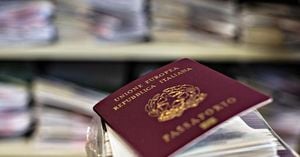The latest poll conducted by IBRIS for Onet reveals a shifting landscape of public trust among Polish politicians as the presidential elections draw near. According to the survey, which was carried out from March 21 to 22, 2025, a significant 46% of respondents expressed trust in Rafał Trzaskowski, making him the most trusted politician in Poland.
In a detailed breakdown following Trzaskowski, the former Prime Minister Mateusz Morawiecki secured the trust of 36.1% of those polled, while President Andrzej Duda was close behind at 36%. This shift illustrates the evolving political landscape, where trust levels appear to be in flux.
Notably, Trzaskowski’s popularity has seen an increase from 43.5% in February to the current 46%, solidifying his position as the leader in trust among Polish politicians. As Onet reported, "Rafał Trzaskowski is the most trusted politician in Poland with 46% of surveyed individuals expressing their trust." This statistic not only enhances Trzaskowski’s image as a frontrunner but also reflects the electorate's growing faith in his leadership capabilities.
However, the rankings also reveal some declining fortunes. Donald Tusk, another key player in the political arena, is now trusted by only 35.2% of respondents, a slight dip of 0.5 percentage points. In the same vein, Karol Nawrocki has faced a minor decline as well, with trust dropping to 33%, a decrease of 0.2 percentage points since the last survey.
Jarosław Kaczyński, a longstanding figure in Polish politics, now stands at 32.9% in terms of trust, while Szymon Hołownia holds a slightly lower position with 32.6%. These trust levels indicate how public perception can quickly change, particularly as political climates shift and prior support wanes.
The survey also highlights a stark issue regarding mistrust in politics, as Grzegorz Braun emerges as the least trusted leader in the poll, with a significant 64.9% of respondents expressing distrust. Reports state, "Grzegorz Braun is the least trusted politician, with 64.9% of respondents expressing distrust," a statistic that paints a concerning picture of his current standing among voters.
Following Braun, Sławomir Mentzen finds himself distrusted by 57.6% of those interviewed, while Jarosław Kaczyński also faces notable skepticism, with 56.7% indicating they do not trust him. Additionally, both Andrzej Duda and Karol Nawrocki share the same level of distrust at 55.6%, suggesting a potential fault line among voters when it comes to their support.
The findings from this poll have significant implications going forward as political parties strategize for upcoming elections. The marked differences in trust among leading politicians signal the potential for significant changes in voter alignment and preferences as the campaigns unfold.
With a total sample size of 1,100 respondents, the IBRIS survey utilizes a CATI method to ensure comprehensive representation of public opinion. As emphasized by the data, the political landscape is never static; it reflects the voices of the people, making the upcoming elections a crucial period for all parties involved.
In conclusion, the trends revealed by the IBRIS poll underscore the necessity for politicians to engage deeply with the electorate and address the growing public concerns that influence trust and support. Whether these shifts will translate into electoral success remains a pivotal question as the dynamic nature of public sentiment continues to be tested in the realm of Polish politics.

![Polacy najbardziej ufają Trzaskowskiemu. Inni politycy daleko w tyle [SONDAŻ]](https://thumbor.evrimagaci.org/SJDztpZwZj5J2hGUTw4YxrOy1jY=/200x0/tpg%2Fsources%2F0f564d3a-7b56-404a-8589-3ebf018b9239.jpeg)



